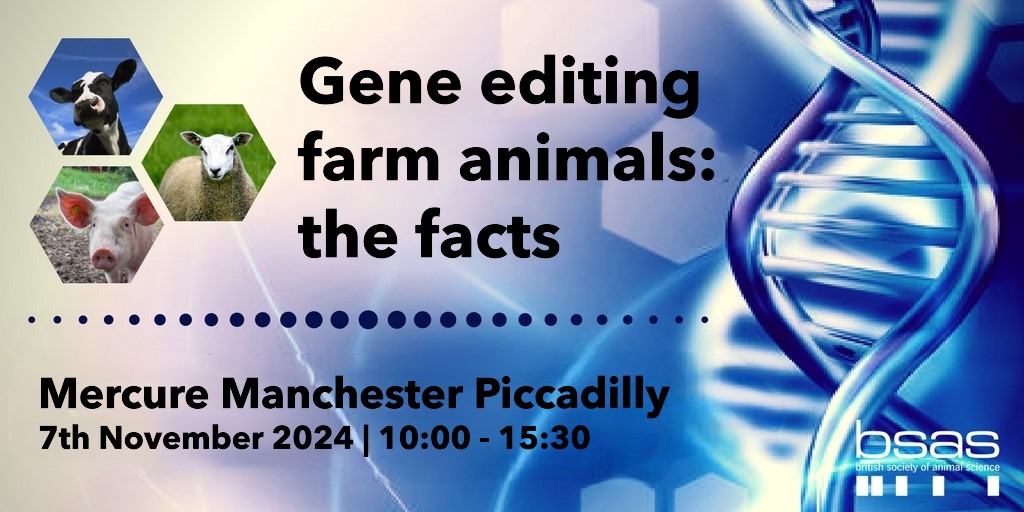Introduction
Gene editing (which is one of the techniques being considered within the Precision Breeding Act) is at the forefront of agricultural innovation, offering techniques to alter the DNA of plants and animals, in a manner that is not distinguishable from normal genetic changes which happen in nature.
This method, notably utilising gene-editing tools like CRISPR-Cas9, enables targeted genetic modifications that mirror natural variations achievable through traditional breeding. Unlike genetic modification, which involves inserting genes from one species into another unrelated species, gene editing introduces traits that could be naturally selected for over time. Increasing resistance to disease is one of the goals for use of the technique that has been progressed. While this has the potential for a major improvement in animal health, there is the possibility of unintended negative outcomes for other aspects of health, functionality and welfare that need to be explored.
The potential practical applications of precision breeding, including gene editing, are vast, particularly in enhancing food production by improving traits such as nutritional content and disease resistance in crops and livestock. However, there are concerns with regard to precision breeding techniques, including gene editing, and this conference will explore the multifaceted aspects of these technologies, with a focus on gene editing, from scientific advancements and global perspectives to animal welfare and ethical considerations.
Conference Objectives
The ‘Gene editing farm animals’ conference aims to:
- Explore Scientific Advances: Delve into the latest precision breeding, and especially, gene-editing technologies and their applications in agriculture.
- Examine Ethical Considerations: Discuss the animal welfare and ethical implications and considerations for farm animals, ensuring responsible innovation and governance for the same.
- Understand Global and EU Perspectives: Analyse the broader landscape of precision breeding policies and practices globally and within the EU and note their impact and any lessons learnt.
- Engage with Farmers' Perspectives: Provide insights into how precision breeding, and especially gene editing, is perceived and utilized by farmers.
- Facilitate In-Depth Discussions: Conduct panel discussions to foster collaboration and knowledge exchange among stakeholders.
Programme
09:00 Registration
Part 1: Chaired by Elizabeth Magowan | AFBI (BSAS Past President)
10:00 Welcome
Elizabeth Magowan | AFBI
10:10 Session 1: Precision Breeding - Legislation
An overview of current and proposed UK legislation
Speaker: Alexander (AJ) Gilbert | Defra
10:35 Session 2: The Science
A comprehensive overview of the science behind precision breeding and especially gene editing in farm animals, including current research and technological advancements.
Speaker: Dr Simon Lillico | Roslin Institute
11:00 Session 3: Ethical Considerations in Precision Breeding
Exploring the moral and ethical issues surrounding the use of precision breeding and especially gene-editing technologies in agriculture.
Speaker: Professor Madeleine Campbell | Nottingham University School of Veterinary Medicine and Science
11:30 Break
Part 2: Chaired by Kim Matthews | AHDB (BSAS Past President)
11:50 Session 4: Animal Health and Welfare
Exploring the potential for positive and negative impacts on animal health and welfare, and methods that could be implemented to safeguard animal welfare
Speaker: Professor Marie Haskell | SRUC
12:10 Session 5: The Broader EU/Global Landscape
An analysis of the regulatory and policy frameworks guiding precision breeding in the EU and globally, highlighting differences and commonalities.
Speaker: Ana Granados Chapatte | European Forum of Farm Animal Breeders
12:30 Session 6: Case Study
Insights into how precision breeding, and especially gene editing, is being adopted by farmers and industry in some countries, including potential benefits and challenges from their viewpoint.
Speaker: Craig Lewis | Pig Improvement Company
13:00 - 13:55 – Lunch
Part 3: Chaired by Gareth Arnott | QUB (BSAS Trustee)
14:00 Session 7: Panel Discussion on Precision Breeding | Supported by The Roslin Institute

A detailed panel discussion featuring experts from various fields to address pressing questions such as will gene editing be essential to feed a growing population sustainably? Are gene edited animals a bigger risk to One Health/One welfare? Facilitating debate and knowledge sharing among attendees.
Panel Members:
Birte Nielsen | Research Director | UFAW
Annie Williams | Business Development Manager, UK Agri-Tech Centre
Hugh Broom | NFU Livestock Board East Chair, Farmer
Alan Mileham | Genetic Visions
15:30 – Close
Conclusion
The ‘Gene editing farm animals’ one day Conference is set to be an informative and engaging event for scientists, industry professionals, and policymakers. It is designed to provide scientific facts which enhance the understanding and knowledge of precision breeding and especially gene editing, in farm animals, among the wider industry, policy and scientific communities. By examining the scientific, ethical, animal welfare and practical dimensions of precision breeding, the conference aims to promote sustainable and innovative agricultural practices and enhance awareness of this area of science so that the various actors across the food supply change can make better informed decisions on this topic.
Join us, in Manchester, on 7th November 2024, to be part of this pivotal event hosted by the British Society of Animal Science.

